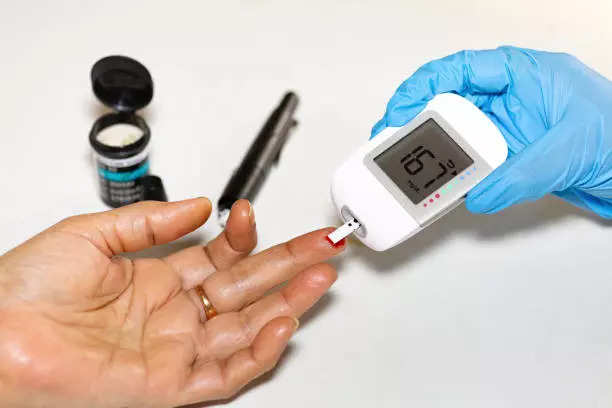5 Shocking Things From Your Daily Routine That Can Spike Your Blood Sugar Levels
When diagnosed with diabetes, it becomes imperative for a person to keep their blood sugar levels in control, for a better and healthier life. However, there are times that despite following all the regulations, you struggle with a glucose imbalance. According to health experts, if your insulin levels are abnormally high, there are bound to be some mistakes you are making somewhere. Let’s find out what these are.

Updated Jun 10, 2023 | 09:37 AM IST

Doctors advise regular checking of blood sugar levels to keep the glucose levels in control
New Delhi: Diabetes is one of the most horrifying diseases that cause a host of health issues apart from affecting your day-to-day life. A proper diagnosis and lifestyle changes are needed or else the ailment can be life-threatening.
Doctors advise regular checking of blood sugar levels, understanding your diet triggers, and changing your lifestyle to keep the glucose levels in control. However, when the blood sugar rises it causes a host of symptoms with drastic effects.
And so, despite eating right, exercising, and taking your diabetes medication properly if your insulin levels are abnormally high, there are bound to be some mistakes you are making somewhere. Let’s find out what these are:
Skipping breakfast
Touted as one of the most important meals of the day, breakfast, according to health experts, is a must for people with type-2 diabetes.
According to a study published in the journal Diabetes Care1, fasting until noon, triggers increased Hyperglycemia and impaired insulin response after lunch and dinner in those suffering from type-2 diabetes.
Researchers say forgoing breakfast may inhibit the function of the pancreas’ beta cells that produce insulin.
Health experts also put major blame on what you eat for breakfast for high levels of glucose in your blood. Rather than consuming sugary foods, diabetes-friendly breakfast foods that are low in carbs like eggs with spinach, mushrooms, tomatoes, smoothies, and oats should be encouraged.
Physical inactivity
It is very important to exercise and work out to manage type-2 diabetes. Apart from helping you maintain weight it also lowers your risk of stroke and heart diseases.
Doctors say physical activity2 increases the body’s insulin sensitivity and helps your cells remove glucose from the blood and use it for energy.
Lack of sleep
Sleep and diabetes management, according to experts, are closely related and monitored. According to the National Sleep Foundation, lack of sleep or insomnia can lead to sudden and long spikes in blood sugar.
Doctors recommend people with type-2 diabetes aim for 7-9 hours every night for adults. Studies say sleep deprivation3 triggers the release of the stress hormone cortisol along with reducing the amount of insulin released when you have the last meal of the day.
Poor dental health
Poor dental health and gum diseases aggravate complications of type-2 diabetes. According to the American Dental Association, experts say unhealthy gums increase blood sugar levels along with a risk of infections and inflammation.
Doctors recommend that people with type-2 diabetes take extra care of their gums by brushing regularly, using floss, and visiting the dentist for checkups.
Taking artificial sweeteners
For many people with type-2 diabetes, diabetes means the end of sugar and the beginning of artificial sweeteners to flavour their foods. But according to studies4, even consuming non-calorie artificial sweeteners like the ones found in diet sodas and those added in tea and coffee do increase blood sugar levels in the long run.
Experts say, once consumed, artificial sweeteners worsen insulin resistance and the body’s ability to keep blood sugar levels steady.
Disclaimer: Tips and suggestions mentioned in the article are for general information purposes only and should not be construed as professional medical advice. Always consult your doctor or a dietician before starting any fitness programme or making any changes to your diet.
End of Article
Videos





02:08
What Are Key Differentiating Points In Poonawalla Fin Corp ? | Explains MD Abhay Bhutada

03:23
Breaking News | BJP MP Accuses Leaders Of 'Adjustment' With Congress In Karnataka, Sparks Infighting

03:38
Manipur Violence Erupts Again As Kukis, Meiteis Refuse Peace Talks| 9 Killed In Flare-Up

03:03
How MD of Poonawalla Fincorp Abhay Bhutada Started His Career ? | Business News

03:56
TMC Workers Clash In West Bengal Ahead Of Upcoming Panchayat Polls | Election News













